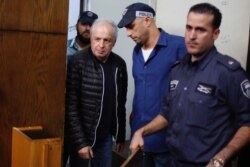Israeli Prime Minister Benjamin Netanyahu is fighting for his political life as the Israeli political system moves toward an expected indictment. His pre-trial hearing began Wednesday on three separate corruption cases, and it will last for four days, ending before the Yom Kippur holiday next week.
The hearing comes after many months of investigation into Netanyahu and is the last step before Attorney General Avihai Mandelblit decides whether or not to indict the prime minister. It also comes as Netanyahu is struggling to put together a governing coalition after inconclusive elections last month.
Unity talks have broken down with former Chief of Staff Benny Gantz of the centrist Blue and White party, and Netanyahu does not have enough right-wing and ultra-Orthodox supporters to reach the magic number of 61 in the 120-seat Knesset.
The prime minister did not attend the hearing, which was held at the Justice Ministry headquarters in Jerusalem. Speaking to reporters outside the hearing, Netanyahu’s lawyer, Ram Caspi, said there are “solid grounds” for reconsidering the allegations against him.
Another of the prime minister’s attorneys, Amit Hadad, said the defense team would present new evidence.
“We’re sure that when we finish, there will be no choice but to close the case,” the Kan public broadcaster quoted him as saying. “These cases must be closed.”
There has been a lot of media speculation that Netanyahu would agree to a plea bargain in which Netanyahu would plead guilty to a lesser charge and retire from public life without a trial.
Netanyahu’s lawyers denied this is their plan.
“I have complete and unreserved confidence in the legal system and law enforcement. I have no doubt the attorney general will formulate his decisions in a professional and appropriate manner,” Caspi said.
A new poll by the Israel Democracy Institute found that 52 percent of Israelis oppose such a deal, and 58 percent believe Netanyahu would not accept it even if it is offered.
The corruption cases against the prime minister range from accepting gifts of cigars and champagne to more serious charges of bribery and breach of trust. In the most serious case, called Case 4000, Netanyahu, who also serves as Minister of Communications is accused of pushing regulatory decisions that benefited Shaul Elovitch.
Elovitch was the controlling shareholder in the Bezeq telecom case and allegedly offered Netanyahu positive coverage on his Walla news site in exchange. Both Netanyahu and Elovitch face bribery charges.
Prosecutors are expected to make a final decision on indicting Netanyahu by the end of the year. Even if indicted, according to Israeli law, he could stay on until he was convicted.
All of Netanyahu’s legal trouble comes as he continues trying to assemble a government. Although his Likud party won one seat less than the centrist Blue and White, Israeli President Reuven Rivlin asked him to try to form a government, as he has the support of 55 Knesset members. He is missing another six, however, to get to the needed number of 61 and a majority. Efforts for a unity government with former Chief of Staff Benny Gantz have not been successful.
The new Knesset is being sworn in tomorrow, even without a governing coalition. The 13 members of the Joint List, a coalition of four mostly Arab parties, said they will boycott the swearing in ceremony to protest a wave of murders in Arab towns.
“Tomorrow, the 13 members of Knesset of the Joint List won’t take part in the festive Knesset swearing-in plenum, as part of the general strike announced by the Arab Higher Monitoring Committee over the wave of murders in Arab towns and the uselessness of the police,” Joint List MK Ahmad Tibi wrote on Twitter.







